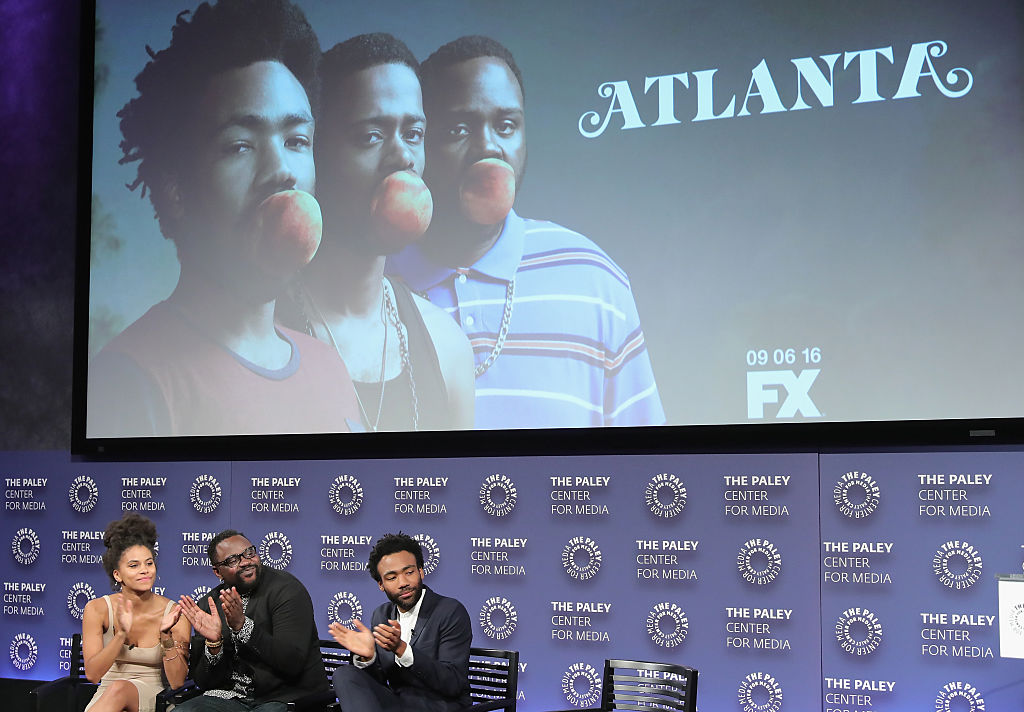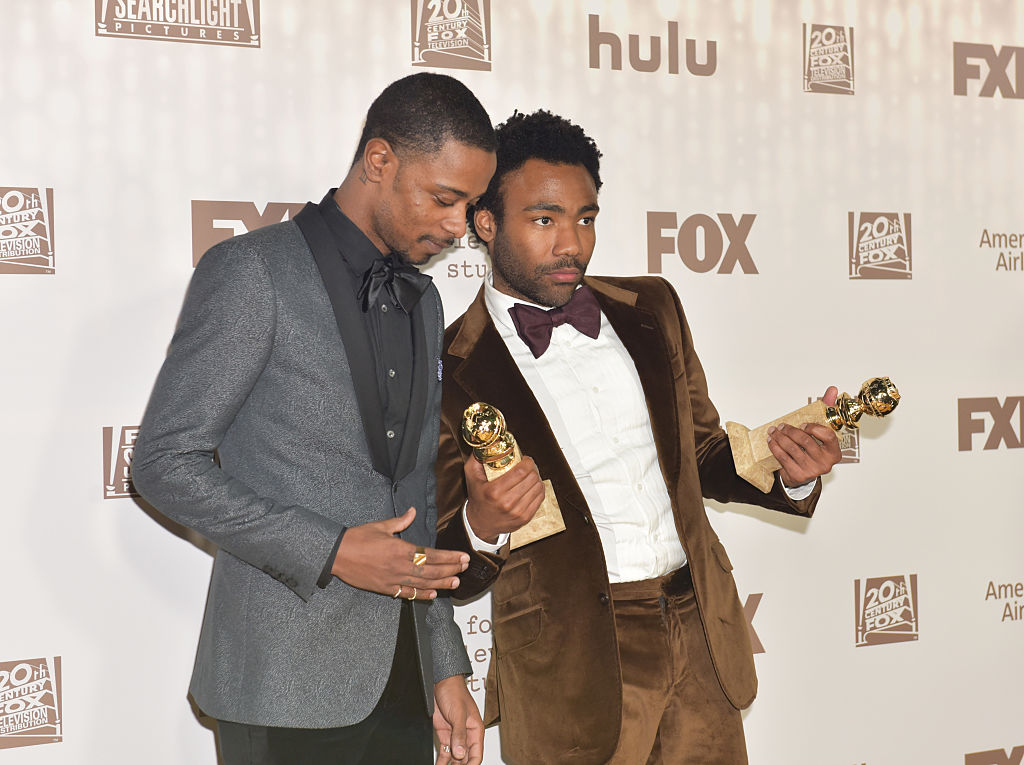Why 'Atlanta' Is One Of The Greatest TV Shows Of All Time
Why ‘Atlanta’ Is One Of The Greatest Shows In TV History

(L-R) Zazie Beetz, Brian Tyree Henry and Donald Glover speak onstage at the “Atlanta” New York Screening at The Paley Center for Media on August 23, 2016, in New York City. | Source: Neilson Barnard / Getty
The very first scene in the very first episode of Donald Glover‘s Atlanta included what Aaron McGruder’s The Boondocks described as “a n***a moment.” In the scene, Alfred Miles aka Paper Boi, played by Brian Tyree Henry, gets into a heated exchange with a Black man who had just broken the side mirror on his car. Aggravated words were had, guns were flashed and Black-on-Black crime seemed imminent as the scene ended with the ominous sound of a gunshot.
Based on the intro to that series premiere, a lot of people thought this was going to be just another Black show about rapper hood dreams and Black people at their lowest.
It turns out the show was that, but also any and everything but that. Atlanta was a Trojan horse that presented itself to the world as a semi-typical Black dramedy, but it ended up being a show that not only shirked traditional Black comedy and drama tropes, but it broke virtually every rule of TV show writing across the board—and still managed to be one of the greatest TV shows of all time, in my not-so-humble opinion.
The series finale of Atlanta aired on Thursday. The episode, titled “It Was All a Dream,” wasn’t your typical series finale. It wasn’t emotional and sentimental the way the finales of shows like The Fresh Prince of Bel-Air and A Different World were. It didn’t bring any story arcs to a conclusion. (Including the aforementioned guns hot scene. Seriously, what happened there? Is buddy who broke the mirror OK?) We still don’t know if Earn and Vann moved to Los Angeles with their daughter or if Alfred ever came to terms with his persistent internal conflict that showed all the signs of clinical depression. For the most part, the final episode of Atlanta was just another episode of Atlanta. And that’s all it needed to be because it matches the show’s energy through its run.
Rather than sticking to conventional and linear storytelling, Atlanta‘s episodes were often disjointed from each other. It is a dramatic and bizarre cacophony of randomness, surrealism, dark comedy, dry comedy and Blackity-Black Blackness. It is a show that was allowed to be anything it wanted to be from episode to episode.
Arguably the first episode that made this explicitly evident was episode 7 of season 1, “B.A.N.” In this episode, Paper Boi was a guest on a fake talk show on a fake Black media network that also featured fake Dodge Challenger commercials among other satirical TV ads. All of a sudden, a TV show that, at the very least, stayed in a lane in terms of its genre, became the same show with an added mixture of satire, sketch comedy and direct social commentary.
Then there were episodes like “Teddy Perkins,” the season 2 episode that is the only one to focus squarely on Darius, the character played by LaKeith Stanfield. This episode set the tone for season 3 which aired 4 years after season 2 and took the cast all the way from Georgia’s Blackest city all the way to a tour of Europe.
A lot of fans of the show found the third season to be a bit off-putting. The main cast was absent in at least half the episodes. The theme of the season appeared to center around white liberal racism, which some Black people thought centered white people in ways the other seasons didn’t, which led to the opinion of some of us that Atlanta was a Black show for white people.

Actors Lakeith Stanfield (L) and Donald Glover, winners of Best Television Series – Musical or Comedy for ‘Atlanta,’ attend FOX and FX’s 2017 Golden Globe Awards after party at The Beverly Hilton Hotel on January 8, 2017, in Beverly Hills, California. | Source: Rodin Eckenroth / Getty
And for some viewers, the show had simply gotten too weird. From the “Three Slaps” episode that fictionalized a real-life Black horror story, to the bizarre and cringy 2 Pac death scene in “Sinterklaas is Coming to Town” to the “Tarrare” episode that had us all asking, “OK, what the hell is wrong with Van?”—it became clear to everyone that this show doesn’t GAF about viewer expectations. It’s a show that loved itself so much that it didn’t care how many fans jumped ship because the ride they were being taken on was wavy and random without a clear destination.
While that characteristic didn’t change much in this final season, the cast was brought back to Atlanta, and we even saw a resolve to the often-strained, on-again-off-again relationship between Earn (Glover) and Van (Zazie Beetz). Earn and Van wasn’t your typical “will they/won’t they” sitcom couple. These were two adults who shared a child and cared for each other but struggled to get it together. And because Atlanta departed from most other Black TV comedies in that it wasn’t so hyperfocused on dating and relationships, it wasn’t until season 4’s “Snipe Hunt” episode that Earn and Van finally declared their love for each other and made themselves an official couple. Until then, their relationship journey was a peripheral story arc that was only highlighted in an episode or two per season.
That being said, one piece of criticism I have about the show is that Van—despite being the only character to have a solo episode in every season—never had much character development that took her beyond being the mother of Earn’s child. This isn’t to say that she had no development at all, but her main conflicts in the show were being constantly reduced to “Lottie’s mom,” her struggling with parenthood and Earn’s refusal to commit to her. And she was never really able to veer out of that box. Van’s story arc was always tied to Earn and Lottie.
The character of Earn, on the other hand, went from being a frustratingly irresponsible and selfish character (to the point where I was happy to see him get his a** beat in season 2’s “North of the Border” episode) who was essentially leeching on his cousin’s rap fame, to a successful manager whose status and financial situation seemed to rise alongside Alfred’s.
Speaking of Alfred—Paper Boi had the most interesting arc on the show. He’s my favorite character. He was what many would consider a “hood n****a”—and he was that—but throughout the series, he was a morally conflicted, often sad, sometimes ignorant, sometimes admirable layered character that was allowed to be vulnerable and softened. (This was especially evident in season 2’s “Woods” episode.
Look, I can go on and on explaining all the nuances and innovation that makes Atlanta not just one of the best Black TV shows ever, but one of the best in general, but I’ll just leave you with one final point.
Black creatives need space to be creative in a limitless way. With the help of director Hiro Murai, Gover and his writing team were able to create a Black show where even “hood” characters were allowed to be Black AF, but also quirky, strange and layered. It broke all the rules and challenged its own viewers like no other show has ever done.
If you’ve never seen it, I recommend you give it a try. Just keep an open mind—you’re going to need it.
SEE ALSO:
Is Donald Glover A ‘Black Genius’?
‘Atlanta’ Takes On The Value Of Human Life In Stirring Shooting Scene
















